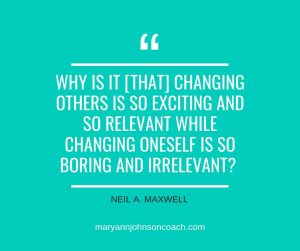 Change can be hard. One reason that change is so challenging is that we misunderstand what change actually looks like and we also misunderstand the time that is required for change.
Change can be hard. One reason that change is so challenging is that we misunderstand what change actually looks like and we also misunderstand the time that is required for change.
I have read many books on change. There is the standard – it takes 30 days to create a new habit. If we are talking about making our bed daily or exercising every morning then that is probably true. But if we are talking about changes that involve our character or our ability to respond differently in times of stress then maybe, just maybe, it will take more.
When I wanted to stop yelling that required a huge mind shift. I had to come to believe that I could actually stop yelling, that it was in my power to make that change. Accepting that fact took a few years.
Then I had to figure out what to do besides yell because it’s easier to replace a behavior than to stop a behavior. Once I knew what I was going to do instead of yelling I had to practice, practice, practice.
And here is where it’s important to understand what change looks like. Change looks like failure long before it looks like success.
Steps to Change
Step One – Realize that you need to make a change.
Step Two – Begin to believe that it is within your power to make a change.
Step Three – Determine what needs to change. Let me give you an example. I needed to get a handle on my complaining. It wasn’t that I wasn’t happy but the words of complaint just kept falling out of my mouth. It’s just too hot! I don’t know why you can’t put your socks in the hamper. I wish the prices weren’t so high. Why won’t my hair just do what I want it to? This meat is overcooked.
When I had this conversation with a friend, she said, “Well, everyone does that!” She is right but that doesn’t make it a healthful or useful practice. I knew that if I controlled what came out of my mouth I would experience far more moments of happiness during the day.
I determined that I needed to express gratitude more often and I did this by using a small notebook where I wrote down what I was grateful for as I went through the day. I also had a second small notebook where I recorded my complaints. Then I would tear up those pages each night. These exercises may seem simple and even silly but they kept my mind on what I wanted to do instead of what I had been doing.
Step Four – Make a firm commitment to doing the work and giving it all the time required. I can always tell when I only wish I was different or hope to be different and when I am committed. That is key. You have to have a firm intention that no matter what it takes, how long it takes or how discouraging it feels you will keep going.
The Process of Change
A – Realize that you will continue to do the very thing you want to change. This is the step where change looks and feels like failure. When I was working to replace yelling with self-control I would often yell. Right after I yelled I would think in my mind, “Rats. I yelled. I don’t want to yell anymore!” I would feel bad and I would feel like a big failure at this self-control thing.
However, I eventually came to understand that every time I recognized that I had errored, gave up blame and took responsibility for my actions and then determined to do better, I was making progress.
B – Stop. Eventually, I would stop in mid-yell. I would mentally catch myself and reverse course. This entailed a fair amount of apologizing. It was uncomfortable but it was progress. I caught myself and made an adjustment.
C – Change. Finally, I would think about yelling and I wouldn’t. I would choose to respond differently. It felt wonderful when I began to experience this step more often. That didn’t mean that I didn’t fall back to step three and four; I did, for a long time. But eventually, I found myself staying in control more often.
It Takes Time to Change Our Way of Being
Here is another place where people in the process of change find themselves in trouble. We think that if it takes 30 days to develop a new habit then that should equate to change but it doesn’t. The kinds of change that I’m talking about, those that make us better people and parents, are changes not just in what we do but in our very being, our character and that requires time.
It took me ten years from the time I realized that yelling was not a good coping skill or parenting tool to consistently staying in control. And the truth is, I can, on occasion, still find myself yelling. It is a lifetime work for me. However, if I had bought into the idea that I needed to accomplish this significant change in 30 days or one year or even five years, well, I might have given up and never made it to where I am today.
My current project, giving up complaining, has been in process for over six years. Sometimes I feel discouraged. But I express gratitude more often than in the past, even though I still complain. I am making progress.
Changing our way of being, who we are, how we respond, doesn’t have to take ten years or even six. But if it does, hang on and keep working.
As Nelson Mandela said, 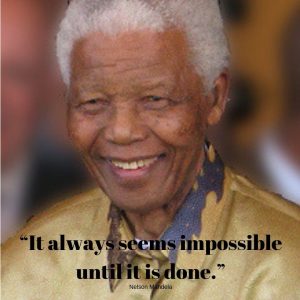

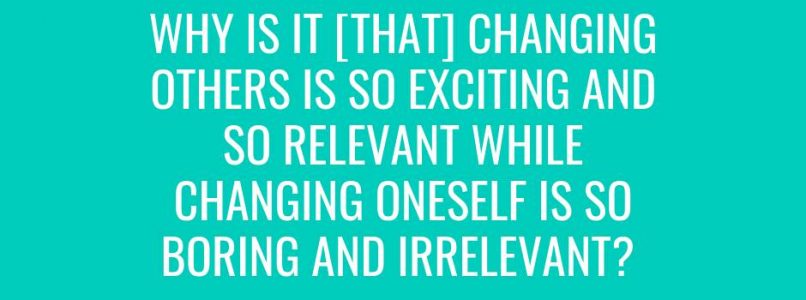

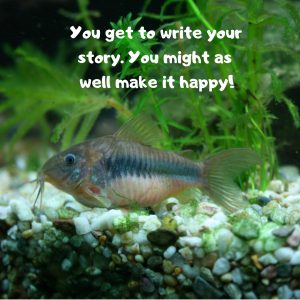 I got a fabulous call recently from a dear friend. She wanted to tell me about her three grandchildren, twins, aged 8 and one, aged 5. They have been playing a game with their grandma when she takes them to school 3 times a week. It’s called, Embellish the Story. One of them begins the story and then they each take a turn adding to it. In other words, they embellish it.
I got a fabulous call recently from a dear friend. She wanted to tell me about her three grandchildren, twins, aged 8 and one, aged 5. They have been playing a game with their grandma when she takes them to school 3 times a week. It’s called, Embellish the Story. One of them begins the story and then they each take a turn adding to it. In other words, they embellish it.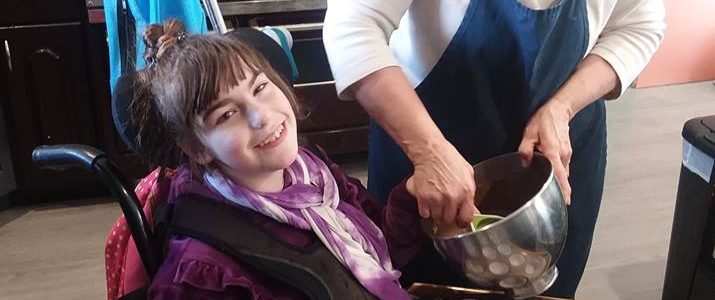
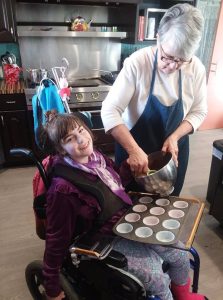 Recently, I posted a photo on Facebook of my twelve-year-old granddaughter making cupcakes. She has cerebral palsy and so it requires some special accommodation to cook with her. We’ve been cooking together now, for many years.
Recently, I posted a photo on Facebook of my twelve-year-old granddaughter making cupcakes. She has cerebral palsy and so it requires some special accommodation to cook with her. We’ve been cooking together now, for many years. 3-18-2010
3-18-2010 and the chair on the table. Jack, of course, took his position on one of the kitchen chairs.
and the chair on the table. Jack, of course, took his position on one of the kitchen chairs.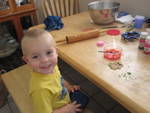 Next came the eggs. I showed Jack and Maggie how to break one and get the contents out. Woohoo!! Whacking eggs suited Jack just fine. He gave it a whack and voila! egg all over the table. Not to worry. We just picked out the eggshells and scraped the egg into the bowl. Good thing we started with a clean table.
Next came the eggs. I showed Jack and Maggie how to break one and get the contents out. Woohoo!! Whacking eggs suited Jack just fine. He gave it a whack and voila! egg all over the table. Not to worry. We just picked out the eggshells and scraped the egg into the bowl. Good thing we started with a clean table. I could help 25-30 kids by myself. But I’m going to be honest here. It went so smoothly because the project was about me and not about the children.
I could help 25-30 kids by myself. But I’m going to be honest here. It went so smoothly because the project was about me and not about the children.






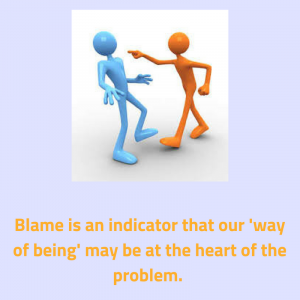 Have you ever noticed that when we’re having trouble with our spouse, neighbor or our children we begin to wonder what we can “do” to make the situation better? Can we devise a new system, have a good old-fashioned “talk it out” session or come up with a consequence/reward and so forth.
Have you ever noticed that when we’re having trouble with our spouse, neighbor or our children we begin to wonder what we can “do” to make the situation better? Can we devise a new system, have a good old-fashioned “talk it out” session or come up with a consequence/reward and so forth. This good, loving mother shared with me that her son is needy, sometimes whiny, and doesn’t respond when asked to do something. He doesn’t like being directed. It’s frankly annoying. The energy between them is not positive and she is short with him.
This good, loving mother shared with me that her son is needy, sometimes whiny, and doesn’t respond when asked to do something. He doesn’t like being directed. It’s frankly annoying. The energy between them is not positive and she is short with him. works PERFECTLY. When she gives him a heads up about a change in the schedule it works PERFECTLY. And as for random touches….well that is making ALL the difference. Not just for her seven-year-old, but for all of her children.
works PERFECTLY. When she gives him a heads up about a change in the schedule it works PERFECTLY. And as for random touches….well that is making ALL the difference. Not just for her seven-year-old, but for all of her children.

 God must have wanted to see how serious I was about the question because I prayed that same prayer every day for three months! Then one night I knew the answer – stop complaining!
God must have wanted to see how serious I was about the question because I prayed that same prayer every day for three months! Then one night I knew the answer – stop complaining! made a serious decision to become a more charitable person, less judgmental. That has been a work in progress too. Here is how they’re connected.
made a serious decision to become a more charitable person, less judgmental. That has been a work in progress too. Here is how they’re connected.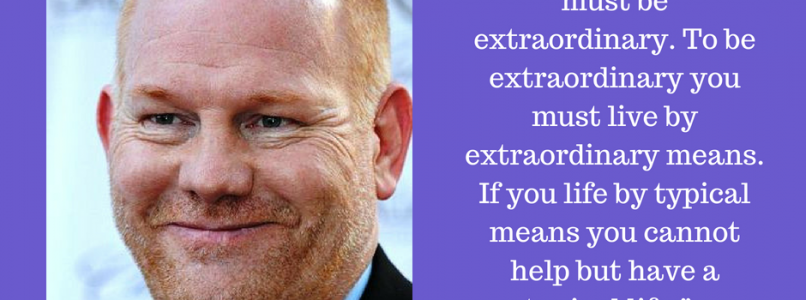
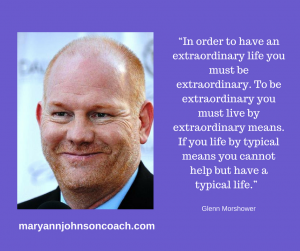 In 2011 I had the extraordinary opportunity to interview Glen Morshower – Agent Aaron Pierce, from the Fox hit “24. I had attended an event he spoke at and I was riveted by his humor, wisdom and pure joy in living. So I plucked up my courage and asked him for an interview that I could share with the mothers and fathers I work with. He said he would be glad to and gave me his phone number. I never called.
In 2011 I had the extraordinary opportunity to interview Glen Morshower – Agent Aaron Pierce, from the Fox hit “24. I had attended an event he spoke at and I was riveted by his humor, wisdom and pure joy in living. So I plucked up my courage and asked him for an interview that I could share with the mothers and fathers I work with. He said he would be glad to and gave me his phone number. I never called.
 I was helping an older woman take a shower. She wasn’t able to stand so she sat. She wasn’t able to wash and so I lathered up the washcloth and helped her out. This was the mother of a dear friend. I had been serving her and her husband for quite some time but bathing his wife was his job. However, on this day he had another obligation. So I was filling in.
I was helping an older woman take a shower. She wasn’t able to stand so she sat. She wasn’t able to wash and so I lathered up the washcloth and helped her out. This was the mother of a dear friend. I had been serving her and her husband for quite some time but bathing his wife was his job. However, on this day he had another obligation. So I was filling in. polish our apology skills nor learn to control our anger and frustration. Rather, the key to overcoming this destructive chain of events is to question our story.
polish our apology skills nor learn to control our anger and frustration. Rather, the key to overcoming this destructive chain of events is to question our story.